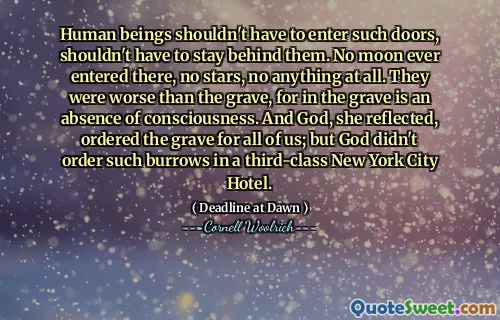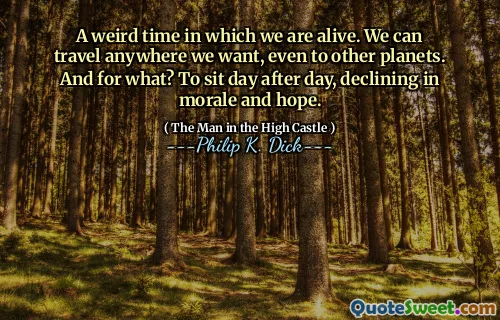
Human beings shouldn't have to enter such doors, shouldn't have to stay behind them. No moon ever entered there, no stars, no anything at all. They were worse than the grave, for in the grave is an absence of consciousness. And God, she reflected, ordered the grave for all of us; but God didn't order such burrows in a third-class New York City Hotel.
This quote paints a stark and haunting picture of human existence trapped within oppressive and dehumanizing environments. The imagery of doors that shouldn’t be entered and spaces where no celestial bodies—no moon or stars—penetrate evokes a sense of emotional and physical confinement, possibly symbolizing the bleakness or darkness of certain life conditions. The comparison to the grave underscores the severity of this environment, yet the observation that the grave entails mere absence of consciousness contrasts with the more insidious nature of these 'burrows'—places where not just life, but the very essence of awareness and hope seem to be stifled. The reflection that God did not order such spaces challenges the notion of divine justice or intention, suggesting perhaps that these conditions are man-made or the result of human neglect and indifference. The setting of a third-class New York City hotel emphasizes social inequality and the disregard for the dignity of those forced to tolerate such environments. It forces us to confront uncomfortable truths about how society treats its marginalized, emphasizing that some spaces morph into prisons of the spirit, stripping individuals not just of comfort, but of autonomy, joy, and light. Such environments are worse than physical death because they strip away the possibilities of consciousness, connection, and purpose. This quote invites reflection on the importance of humane conditions, societal responsibility, and the inadvertent or deliberate neglect that can turn basic human acts into oppressive suffering.


